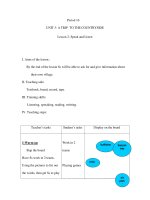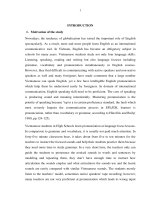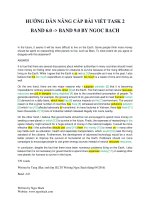model writing 8.5 solving traffic problems by moving businesses to the countryside 2
Bạn đang xem bản rút gọn của tài liệu. Xem và tải ngay bản đầy đủ của tài liệu tại đây (234.77 KB, 9 trang )
Overall band score
8.5
8+9+8+9
See below C&C LR GRA
Model answer
WRITING TASK 2
You should spend about 40 minutes on this task.
Write about the following topic:
Traffic and housing problems in major cities could be solved by moving large
companies, factories and their employees to the countryside.
To what extent do you agree or disagree?
Give reasons for your answer and include any relevant examples from your own
knowledge or experience.
Write at least 250 words.
Original answer APPROACH 2
In light of mounting problems concerning traffic and housing in metropolitan
areas, the question of how to reverse the status quo has been a topic of public
interest lately. One possible solution that some people, myself included, agree is
to relocate big businesses and industrial plants, along with their people, to rural
locales.
The primary reason for my belief is that the presence of large companies and
plants in cities is the major cause of traffic congestion and housing scarcity in
these areas. This manifests itself starkly in the way the influx of workers traveling
back and forth from home to the workplace are causing bumper-to-bumper traffic
during peak hours. By the same token, as more and more people migrate to cities
for employment, it has caused overcrowding, concomitantly giving rise to
accommodation shortages and driving up rental. Given these reasons, if all big
enterprises and factories, as well as their workforces, were relocated to rural
locations, it could effectively mitigate these two pressing issues.
Of course, one might cite the colossal costs of shifting business quarters and
activities to rural areas that could discourage businesses from relocating to rural
areas. However, this is far from insoluble, provided that governments offer
financial incentives and other special benefits for companies that agree to move
out of cities. This has proven successful in the UK, where the government has
implemented several tax-cut policies for businesses that move their headquarters
to regional cities, incentivizing the rural relocation of many big corporations as a
result. Another example can be seen in Germany, where the same measures have
helped reduce the number of large companies based in Berlin, leading to lower
traffic volumes and more affordable housing options in that city
In conclusion, I am convinced that the proposal of moving large companies,
plants, and their workers out of cities is promising in terms of tackling urban
housing and traffic problems, as long as the government is actively involved in
facilitating this scheme.
Overall band score
8.5
8+9+8+9
TR – Task Response nb – GRA and LR errors have not been corrected
Band score 8
I’m undecided between 8 and 9.
Note that when you said if all big enterprises and factories, as well as their
workforces, were relocated to rural locations it is unrealistic. In questions like
this, the best I would hope for would be to improve the situation slightly.
Claiming to solve the problem is unrealistic.
You have a clear position throughout and all parts of the question are addressed.
Your position is coherent and well-argued.
The ideas are relevant, extended and there are no contradictions.
Advice On Brainstorming For Task 2
As you’re planning and writing your answer, remember to constantly
ask yourself if you’re answering the question. Check back to the
question a few times as you think of ideas to make sure they're
directly relevant.
Make sure your introduction directly addresses the
question.
Make sure your ideas address all parts of the question. If
the question asks for solutions, in the plural, you must
suggest at least 2.
Make sure your main ideas, as stated in the first sentence
of the main body paragraphs, are directly relevant to the
question.
Make sure your supporting ideas, which follow the main
ideas in the main body paragraphs, directly support the
main idea.
Be especially careful if you’ve answered similar question
before, as there will always be important differences.
Make sure your conclusion directly answers the question,
that it is consistent with the ideas in the main bodies, and
that it does not contradict the introduction.
In light of mounting problems concerning traffic and housing in metropolitan
areas, the question of how to reverse the status quo has been a topic of public
interest lately. One possible solution that some people, myself included, agree is
to relocate big businesses and industrial plants, along with their people, to rural
locales.[a]
The primary reason for my belief is that the presence of large companies and
plants in cities is the major cause of traffic congestion and housing scarcity in
these areas[b]. This manifests itself starkly in the way the influx of workers
traveling back and forth from home to the workplace are causing bumper-tobumper traffic during peak hours. By the same token, as more and more people
migrate to cities for employment, it has caused overcrowding, concomitantly
giving rise to accommodation shortages and driving up rental. Given these
reasons, if all big enterprises and factories, as well as their workforces, [c]were
relocated to rural locations, it could effectively mitigate these two pressing issues.
[d]
Of course, one might cite the colossal costs of shifting business quarters and
activities to rural areas that could discourage businesses from relocating to rural
areas[e]. However, this is far from insoluble, provided that governments offer
financial incentives and other special benefits for companies that agree to move
out of cities. This has proven successful in the UK, where the government has
implemented several tax-cut policies for businesses that move their
headquarters to regional cities[f], incentivizing the rural relocation of many big
corporations as a result. Another example can be seen in Germany, where the
same measures have helped reduce the number of large companies based in
Berlin, leading to lower traffic volumes and more affordable housing options in
that city[g][h]
In conclusion, I am convinced that the proposal of moving large companies,
plants, and their workers out of cities is promising in terms of tackling urban
housing and traffic problems, as long as the government is actively involved in
facilitating this scheme. [i]
C&C - Cohesion and Coherence nb GRA and LR errors have not been corrected
Band score 9
Excellent cohesion and coherence throughout, with no errors.
The sentences have a natural flow characteristic of high band score answers.
Paragraphing for Task 2
I recommend you write 4 paragraphs as follows:
Write an introduction, that explains what the question is.
After reading the introduction, the reader should have a
good idea what the essay is about, and what your position
(opinion) is. It should be possible to write an introduction in
under 50 words. It is not necessary to write a long
background statement.
Write 2 main body paragraphs. This should allow you to
expand on the ideas sufficiently to persuade the examiner
that you’ve fully supported the main ideas. If you write 3
main bodies, it is more difficult to expand and support them
sufficiently to get a high score.
If it’s a two-part question, answer the questions in the order
they’re given and write one paragraph per question.
The main body paragraphs should be 100-120 words, and
each paragraph should have a clear topic sentence and 2 or
more supporting ideas which support the topic sentence with
reasons, evidence, and examples. Do not waste time with
lots of background information.
The topic sentences should directly address the question.
The conclusion should be consistent with the introduction
and the main ideas, and it should not introduce new ideas. It
should directly answer the question. Do not leave the
examiner in any doubt about whether you’ve answered the
question.
If you write a third paragraph in a discuss both sides question
to clarify your position, make sure that give a good reason to
reject one of the sides. If you just restated the original ideas
about one side, the examiner may decide you have covered
one side more than the other.
It is also ok to write a third body paragraph in a to what
extent question if you have main ideas which both agree and
disagree with the proposition. Avoid short paragraphs, with
under 70 words, as it may be difficult to show a clear central
topic in a short paragraph.
In light of mounting problems concerning traffic and housing in metropolitan
areas, the question of how to reverse the status quo has been [j]a topic of public
interest lately. One possible solution that some people, myself included[k], agree
is [l]to relocate big businesses and industrial plants, along with their people, to
rural locales.[m]
The primary reason for my belief is that the presence of large companies and
plants in cities is the major cause of traffic congestion and housing scarcity in
these areas[n]. This manifests itself starkly in the way [o]the influx of workers
traveling back and forth from home to the workplace are causing bumper-tobumper traffic [p]during peak hours. By the same token, as more and more people
migrate to cities for employment, it has caused overcrowding, concomitantly
giving rise to accommodation shortages and driving up rental[q]. Given these
reasons[r], if all big enterprises and factories, as well as their workforces, were
relocated to rural locations, it could [s]effectively mitigate these two pressing
issues.
Of course, one might cite the colossal costs of shifting business quarters and
activities to rural areas that could discourage businesses from relocating to rural
areas[t]. However, this is far from insoluble, provided that governments offer
financial incentives and other special benefits for companies [u]that agree to move
out of cities. This has proven successful in the UK, where [v]the government has
implemented several tax-cut policies for businesses that move their headquarters
to regional cities, incentivizing the rural relocation of many big corporations as a
result. [w]Another example can be seen in Germany, where the same measures
have helped reduce the number of large companies based in Berlin, leading to
lower traffic volumes and more affordable housing options in that city[x]
In conclusion, I am convinced that the proposal of moving large companies,
plants, and their workers out of cities is promising in terms of tackling urban
housing and traffic problems, as long as the government is actively involved in
facilitating this scheme. [y]
LR- - Lexical resource nb Some GRA errors have not been corrected
Band score 8
Vocabulary is used accurately with sufficient flexibility to show precise meaning,
and with only minor inaccuracies, which is good for a band score 8.
In light of mounting problems concerning traffic and housing [z]in metropolitan
areas, the question of how to reverse the status quo [aa]has been a topic of public
interest lately. One possible solution that some people, myself included, agree [ab]is
to relocate big businesses and industrial plants, along with their people, to rural
locales.
The primary reason for my belief is that the presence of large companies and
plants in cities is the major cause of traffic congestion and housing scarcity in
these areas. This manifests itself starkly [ac]in the way the influx of workers
traveling back and forth from home to the workplace [ad]are causing bumper-tobumper traffic during peak hours. By the same token, as more and more people
migrate to cities for employment[ae], it has caused overcrowding, concomitantly
giving rise to accommodation shortages and driving up rental. Given these
reasons, if all big enterprises and factories, as well as their workforces, were
relocated to rural locations, it could effectively mitigate these two pressing issues.
Of course, one might cite the colossal costs of shifting business quarters and
activities to rural areas that could discourage businesses from relocating to rural
areas. However, this is far from insoluble, provided that governments offer
financial incentives and other special benefits for companies that agree to move
out of cities. This has proven successful in the UK, where the government has
implemented several tax-cut [af]policies for businesses that move their
headquarters to regional cities, incentivizing the rural relocation of
many big [ag]corporations as a result. Another example can be seen in Germany,
where the same measures have helped reduce the number of large companies
based in Berlin, leading to lower traffic volumes and more affordable housing
options in that city
In conclusion, I am convinced that the proposal of moving large companies,
plants, and their workers out of cities is promising in terms of tackling urban
housing and traffic problems, as long as the government is actively involved in
facilitating this scheme.
GRA – Grammatical range and accuracy nb Some LR errors have
not been corrected
Band score 9
Grammar is used accurately a wide variety of structures, which should be good for
a band score 9.
Punctuation is use correctly throughout.
Appropriate structures are used throughout.
In light of mounting problems concerning traffic and housing in metropolitan
areas, the question of how to reverse the status quo has been a topic of public
interest lately. One possible solution that some people, myself included, agree is
to relocate big businesses and industrial plants, along with their people, to rural
locales.
The primary reason for my belief is that the presence of large companies and
plants in cities is the major cause of traffic congestion and housing scarcity in
these areas. This manifests itself starkly in the way the influx of workers traveling
back and forth from home to the workplace are causing bumper-to-bumper traffic
during peak hours. By the same token, as more and more people migrate to cities
for employment, it has caused overcrowding, concomitantly giving rise to
accommodation shortages and driving up rental. Given these reasons, if all big
enterprises and factories, as well as their workforces, were relocated to rural
locations, it could effectively mitigate these two pressing issues.
Of course, one might cite the colossal costs of shifting business quarters and
activities to rural areas that could [ah]discourage businesses from relocating to rural
areas. However, this is far from insoluble, provided that governments offer
financial incentives and other special benefits for companies that agree to move
out of cities. This has proven successful in the UK, where the government has
implemented several tax-cut policies for businesses that move their headquarters
to regional cities, incentivizing the rural relocation of many big corporations as a
result. Another example can be seen in Germany, where the same measures have
helped reduce the number of large companies based in Berlin, leading to lower
traffic volumes and more affordable housing options in that city
In conclusion, I am convinced that the proposal of moving [ai]large companies,
plants, and their workers out of cities is promising in terms of tackling urban
housing and traffic problems, as long as the government is actively involved in
facilitating this scheme.









